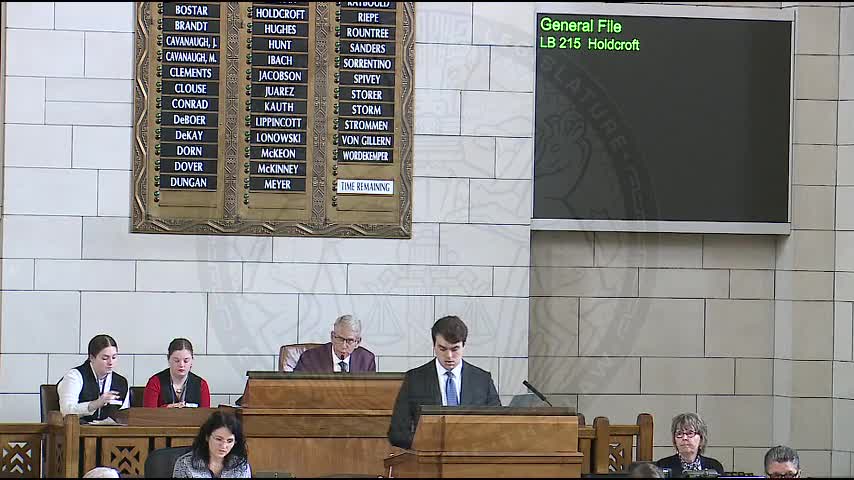Senators advance second‑chance commutation bill after lengthy debate over victims and reentry
Get AI-powered insights, summaries, and transcripts
Subscribe
Summary
The Legislature advanced LB215, a narrowed 'second chance' commutation process that adds the Parole Board as an advisory step for long‑term incarcerated people seeking commutation. The amendment removing an automatic 'clean slate' provision passed before moving the bill forward.
After several hours of testimony and floor debate, the Nebraska Legislature advanced LB215 on April 24, 2025. The bill — as amended (AM556) — sets a multi‑step process for possible commutation reviews for incarcerated people who have served long sentences and who meet eligibility thresholds.
The committee amendment removed a separate automatic "clean slate"/expungement element and focused the measure on adding the Nebraska Board of Parole as a formal adviser to the Board of Pardons when considering commutation of long sentences. Advocates described the bill as a way to give the Pardons Board better vetting and structured reentry planning for candidates; opponents urged caution and repeated concerns about victims' families and public safety.
Under AM556 as passed by the body, eligibility for the second‑look process depends on age at the time of the offense and time served: persons who committed their crime before age 26 become eligible for a review after serving 25 years; those 26 or older become eligible after serving 30 years. The Department of Corrections is to identify potential candidates and notify the Parole Board at least five years before eligibility so the Parole Board can work with candidates on programs and transition planning and solicit input from victims and community stakeholders. Parole Board recommendations would be advisory to the Board of Pardons; the Board of Pardons retains final authority to grant (or deny) commutation.
Senator Rick Holcroft, sponsor of LB215, described site visits to correctional facilities and meetings with lifers and said he was persuaded many meet a high threshold of rehabilitation. He said the Parole Board already conducts thousands of parole hearings and is practiced at assessing rehabilitation and reentry readiness. "The final decision to grant commutation remains in the hands of the Board of Pardons," Holcroft emphasized repeatedly. Supporters including Senators McKinney, Duncan and Dover pressed for the bill as a narrowly tailored tool: fewer than 150 incarcerated people were estimated to meet the statutory qualifications, and the Parole Board already conducts around 1,200 hearings annually.
Opponents and some speakers pressed the bill’s sponsors on victims’ interests; Senator Sorrentino said there had been little public attention to victims during the floor debate and asked the body to ensure victims were offered voice and notice in the process. Sponsors pointed to provisions requiring community and victim notification and opportunities for input at Parole Board reviews.
The committee amendment (AM556) that removed the clean‑slate provision passed on a roll call after the chamber was briefly placed under call; later the full bill advanced to Enrollment and Review-Initial by a recorded vote of 25 to 14. Lawmakers said the next steps will include refining implementing language on notification and resourcing for the Parole Board and DOC to manage the multi‑year review process. The Board of Pardons continues to hold final authority on commutations; LB215 directs agencies to build reentry plans including housing, employment, mental‑health services and mentoring for any commuted individuals placed on parole.
